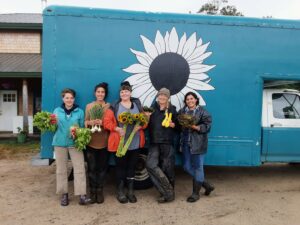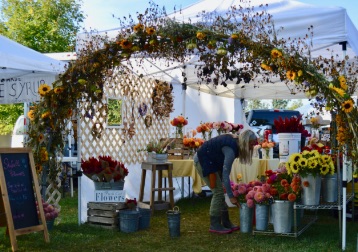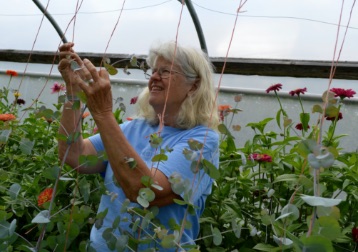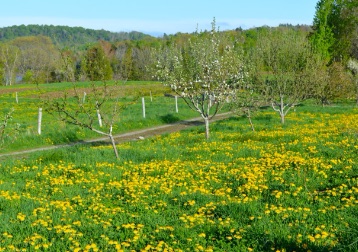Pine Root Farm

Ideal candidates are either available for our full season April – November, or for our peak season July – September. We do not have any year-round opportunities, but happily welcome back apprentices for a second season who did well, would like more responsibility, and have more to learn from our farm.
Pine Root Farm is located in beautiful Steep Falls, Maine. Our ten acre field is backed by woods and the mighty Saco River, and fronted by a Route 113, a popular scenic route that brings you west to the White Mountains or east to Portland and the coast. The area is full of hiking trails, swimming holes, and most importantly ice cream stands. It’s the perfect balance of quiet rural living while not being too far from it all. Having a car to explore with is recommended.
We grow 10 acres of mixed vegetables, flowers, and herbs. All of our produce is sold through our bustling on-site farm stand, a large CSA, and the Portland Farmers Market twice a week. We’re focused on providing our community with healthy, accessible food and work closely with food banks, fill about 125 Maine Senior Shares, and run a Prescriptions for Produce program in partnership with a local health center.
We have a 50’ prop house where we start all of our transplants for the farm and seedlings for our spring sale. We have two 100’ high tunnels that we use primarily for tomatoes and other heat lovers. Most of our field crops are grown in black plastic mulch with drip irrigation, interseeded with rye and clover where appropriate. Primary crops include: sweet corn, cucumbers, eggplant, garlic, kale, lettuce, melons, peppers, potatoes, pumpkins, radishes, squash, and tomatoes. We also grow sunflowers, mixed cut flowers, and herbs. Livestock includes 30 bantam chickens for decoration, an old border collie, a giant labradoodle puppy named Monkey, an overly friendly cat, and a human toddler.
We farm in concert with our family in Cornish (Merrifield Farm), so we have access to a fleet of tractors and equipment, much of it from the 1940s as well as newer Kubotas. All of our field prep is done with tractors, we plant primarily with a water wheel, and cultivate with a Super C. Detail weeding, and all of our harvesting, washing, and packing are done by hand.
Pine Root Farm is a conventional operation, but maybe unconventional is a better term. Much of our knowledge comes from our ancestors who have farmed in Maine for generations; we also look to resources like the extension service, MOFGA, and our apprentices so that we are always learning about and implementing more sustainable practices. Our goal is to grow as much affordable produce for our community as we can, take care of our land, and make a modest living.
Our full season apprentices will learn about and perform almost every task required to operate the farm, and should end the season feeling like they could do so without us. We value hands-on learning, side-by-side instruction, and empowerment through responsibility and independence.
Work performed/skills learned include:
– Greenhouse management
– Field prep
– Drip irrigation
– Basic tractor operation (optional)
– Planting (transplants and direct seed)
– Weeding (hand, hoes, tractor)
– Pruning and trellising
– Interseeding
– Spraying (deer repellent, BT)
– Harvesting a diverse array of crops
– Efficient wash/pack
– Mixed bouquet harvest and arranging
– Field clean-up
– Garlic planting
– Basic carpentry
– Basic record keeping
– Running a free-choice CSA
– Running a farm stand
– Attending a farmers market
– Community involvement/food access/free event planning
Preference will be given to applicants with at least one season of farming experience, but we also value any physical outdoor job or intensive customer service such as waiting tables. A driver’s license is also required.
We look for:
– A very strong work ethic and a desire to learn
– A positive attitude and great communication skills
– The physical and mental strength to get through a long season
– Willingness to take direction from any gender or age, including coworkers
– The ability to thrive in a team or alone, to embrace both supportive and leadership roles
– The self-awareness and self-advocacy needed to live and work with a small, diverse group of people in a rural setting
– A respect for the apprenticeship program and our farm business
Hours can vary, but expect to work up to 60 hours a week at peak season. Apprentices work 6 days a week, with one day off (not a weekend day) and an additional paid day off each month. More time off can be arranged in advance but will not be paid. Paid sick and personal days are given as needed. We expect apprentices to be ready to work on time every time – start time is 8am unless it’s going to be very hot, then we consent to an earlier time in exchange for a long siesta or ending sooner. Market days entail leaving as early as 4am.
Being able to take care of and advocate for yourself effectively is crucial to making it through the challenges of a farming season. We expect apprentices to put equal effort into maintaining a harmonious living environment as well as a working one. Getting involved with the community via food access work and pursuing educational opportunities are both strongly encouraged!
Teaching is our favorite part of the apprenticeship program! We accommodate all learning styles, and are happy to focus on your particular interests and goals. Most instruction is given verbally, followed by a side-by-side demonstration, an opportunity to perform the task with immediate feedback, and of course hours of practice. Written instructions, and at the very least a written to-do list, are also available. Class time or readings are rare, but for example we sometimes treat topics like irrigation, mixed bouquet making, or canning as their own special “course”. We believe that the best way to learn is to teach, so you may be asked to pass your new expertise on to others, and we love learning from you as well.
One-on-one check-ins are done 2 weeks after starting, at mid-season, and at end-of-season. Additionally, we will check in if needed to offer extra feedback if we feel like something has to improve, or if we ourselves need to do something differently. In the rare instance that we have to let someone go, there would be a series of check-ins, opportunity to improve, and two weeks to find a new farm or make plans while continuing to work. We hope that apprentices will also give us two weeks notice so that we can plan.
I (Ruby) farm full-time April through November while also co-parenting a toddler. In the winter I work on planning for the next season, build things around the farm, hibernate with my family, and make pottery for fun.
Each morning at 8am we circle up to go over the goals for the day, as well as stretch and check in. We prefer to work alongside our apprentices and be on the farm as much as possible, but as the business (and toddler!) grows, we get pulled away to manage behind the scenes or take a trip to the playground, and we expect our apprentices to understand that and to work just as effectively with or without us. We have clear systems established for harvest schedules, farm stand shifts, etc, so once folks have settled in it’s easy to accomplish a lot without micromanaging.
We provide a starting stipend of $1,000/month, room and board, and an end of season bonus for all of our apprentices staying two months or longer. The bonus has a baseline of $100/per month worked, increased for exceptional performance or a profitable year. Please see the room and board section for more details on that.
Arrangements for shorter stays, or apprentices wishing to live off-farm, will be negotiated differently. Second year (with us) apprentices receive $2,000/month and opportunities to profit share in a specific enterprise. We may also have part time hourly positions available for local, experienced help, for example as a farm stand manager or at farmers market in Portland.
While we have successfully hired many apprentices remotely, we strongly prefer candidates to visit if they are able. It’s very challenging for us to replace an apprentice even early in the season, so we work hard during the interview process to ensure a successful fit, and we encourage you to do the same. After the first two weeks we check in to make sure the arrangement is working for everyone. In the rare case that an apprentice is asked to leave or decides to end their apprenticeship before the agreed upon end date, there is usually a one or two week period where they still work and live with us while finding a new farm or while we find a replacement. It’s important to take the commitment you make seriously, as seasons can be severely impacted by apprentices leaving.
We have an “apprentice village” nestled in the woods at the edge of our field, a one minute walk from the house. Think glamping: you’ll have your own furnished one room cabin with electricity (outlets, light, fan). There’s also a common space, outhouse, fire pit, hammock, and irrigation pond for quick dips. The main house/farm stand has a communal kitchen, outdoor and indoor shower, indoor toilet, laundry, and wifi. We live in a small apartment over the stand, and welcome our crew into our space for weekly dinners and occasional movie nights.
We provide basic groceries and limitless veg, our crews are well fed and we accommodate all diets. Usually apprentices make their own meals, but cooking for the group happens organically and we have at least one dinner together every week. Household chores are done by everyone, facilitated by a chore wheel. It’s very important to pull your weight in a communal living situation, and to be able to resolve your own dish dramas. No smoking near the stand, house, or apprentice village. No drinking or marijuana use during work hours or in any way that interferes with your work, and no underage drinking/smoking. No illegal substances. We hire people with varied life experiences, so being respectful about substance use around others is a must.
Yes. Our manual covers expectations for work performance, communal living guidelines, as well as our responsibilities to our apprentices. We review and sign it together when you arrive. We also have a packing list we can email you if needed.
I (Ruby) grew up on Merrifield Farm in Cornish. My sister Grace and I grew cash crops together from the age of 8, and both of us continued farming through highschool and college. At 19 I took over a local free-lease that included 10 acres of fields and a farm stand. Grace joined me the second year, and the two of us built it into a thriving business that she continued to run until 2021. After graduating College of the Atlantic in 2013 (where I studied anything but agriculture, focusing on community development, sustainable business, and design/build), I started Pine Root Farm in Steep Falls on land that was owned by my father.
My family still farms in Cornish, though my parents have “retired” and grow pumpkins for wholesale, and my sister (now a midwife) and brother-in-law are self-described gentlemen farmers, growing fun crops that they wholesale to me and stewarding the family land. We all help each other out, but I run Pine Root alone with the help of a wonderful seasonal crew. I have benefited immensely from being born into a farming family: I had access to land, equipment, social connections, and generations of knowledge. Hopefully I can pass on some of that privilege by training new farmers.
Our family and farm crew tend to lean to the left, but as long as our apprentices can be respectful of each other and our community, we’re set!
Education and Relationship Building: We share as much of our knowledge as we can, honestly and frequently. We encourage our apprentices to learn from other farmers and organizations while in Maine, and to teach us as well. We are available to our apprentices as mentors for life.
Equity and Inclusivity: We challenge our own perspectives and acknowledge our privileges. We are committed to creating a more equitable farming community through hiring historically and currently under-supported beginning farmers.
Environmental Sustainability: We steward the land responsibly and balance our environmental and social goals.
Safe and fair: We strive to make the apprenticeship program accessible and beneficial to everyone, and are grateful to all the individuals who choose to work with us. We put clear communication and respect before all else.
Former apprentice reference
Emily Cai
Former apprentice reference
Emily McCarthy
Personal reference
Nichole Howard, Long-term Employee/Friend



Pine Root Farm
- Physical Address
-
20 Farm Ln
Cornish, ME 04020, USA
- Phone

